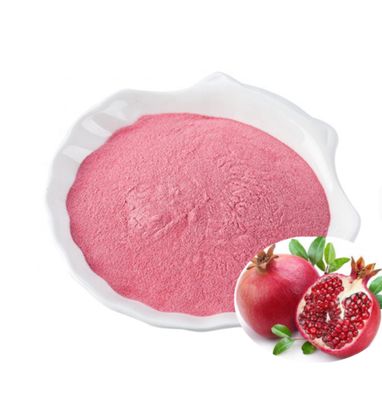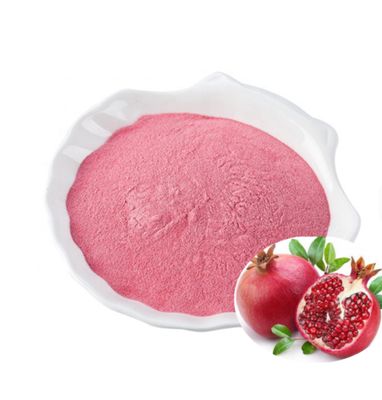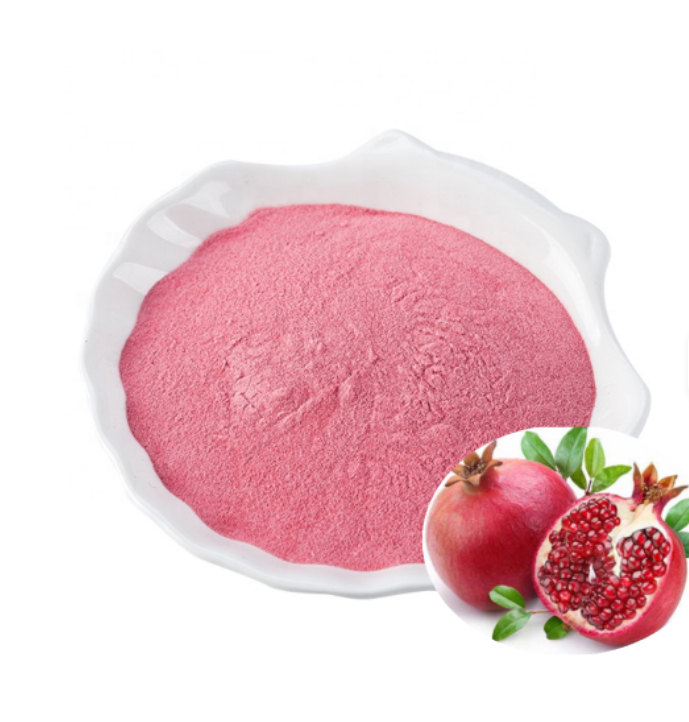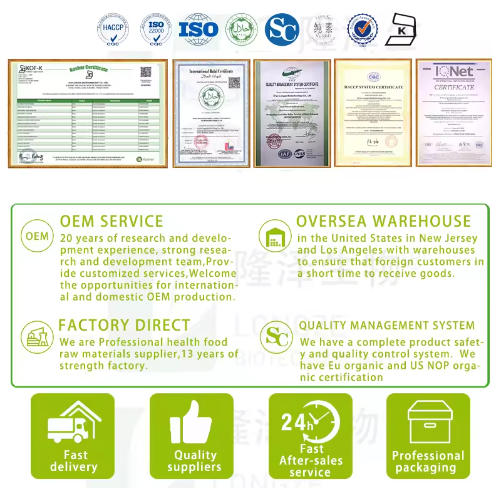
Excellent quality organic fresh Pomegranate fruit juice concentrated Pink powder purple-red powder purple-red powder used in the food and beverage industries
-
Highlight
organic pomegranate juice powder
,food-grade pomegranate concentrate powder
,natural fruit powder for beverages
-
Product NamePomegranate Fruit Juice Concentrated Powder
-
MOQ10kg No Minimum Order
-
Shelf Life24 Months Orange Fine Powder
-
BrandBAISFU
-
AppearancePink Purple Powder
-
OriginXi'an Shaanxi (China Mainland)
-
Particle Size100% Pass 80 Mesh
-
CertificationSC/KOSHER/HALAL/COA/MSDS
-
Package500ml/1KG/5KG/10KG/25KG/180KG
-
Product Code85234 Free Samples
-
Place of OriginShaanxi Xi'an ,Inland China
-
Brand NameBaisfu
-
CertificationSC/KOSHER/HALAL/ISO/COA/MSDS
-
Model Numberfresh Pomegranate fruit juice concentrated powder
-
Minimum Order Quantity50kg Any quantity of customized packaging No Minimum Order
-
PriceDelivery Time: Ship Within About 2-3 Working Days After Receiving Payment
-
Packaging Details500ml/1KG/5KG/10KG/25KG/180KG
-
Delivery Time2-3 working days
-
Payment TermsL/C, D/P, D/A, T/T, Western Union
-
Supply Ability20000Ton/Month
Excellent quality organic fresh Pomegranate fruit juice concentrated Pink powder purple-red powder purple-red powder used in the food and beverage industries
pomegranate flavor
pomegranate flavor pairings
pomegranate flavor frenzy
pomegranate flavored syrup
pomegranate flavored water
pomegranate flavor profile
pomegranate flavored apples
pomegranate flavored lemonade
pomegranate flavor description
pomegranate flavor combos
Excellent quality organic fresh pomegranate fruit juice concentrated powder purple-red powder used in the food and beverage industries
![]()
Of course. Here is a detailed overview of pomegranate flavor, covering its profile, sources, uses, and how it compares to the other flavors and powders we've discussed.
What is Pomegranate Flavor?
"Pomegranate flavor" refers to the distinctive taste profile of the pomegranate fruit, which is a complex blend of sweet, tart, and slightly tannic or bitter notes. This flavor can be delivered in several forms, from natural concentrates to synthetic creations.
The primary goal of a pomegranate flavor, especially in processed foods, is to capture this unique complexity and replicate the taste of the fresh fruit's juicy arils (the seed casings).
Sources of Pomegranate Flavor
Pomegranate flavor is available in different forms, each with its own use case:
1. Natural Pomegranate Flavor:
-
Source: Derived directly from the pomegranate fruit itself.
-
Forms:
-
Pomegranate Juice Concentrate: A reduced, syrupy juice that provides a strong, authentic flavor. It contains the fruit's natural sugars.
-
Pomegranate Powder: Made by dehydrating and grinding the juice or the whole fruit (including the arils and sometimes the peel for extra antioxidants). This is the closest analog to the other fruit powders we've discussed.
-
Natural Flavor Extracts: Created by capturing the volatile aromatic compounds from the fruit.
-
2. Artificial Pomegranate Flavor:
-
Source: Synthetically created in a lab using chemical compounds.
-
Purpose: To mimic the taste of pomegranate at a lower cost and with greater stability than natural sources. It's free of the fruit's natural sugars and colors, allowing manufacturers more control.
3. Nature-Identical Pomegranate Flavor:
-
Source: Chemically synthesized compounds that are molecularly identical to those found in a natural pomegranate.
-
Purpose: Offers a consistent and potent flavor that is considered "natural" in many regions (unlike "artificial" flavors) but is more affordable and stable than extracting it directly from the fruit.
Primary Uses of Pomegranate Flavor
Pomegranate flavor is highly popular across multiple industries due to its appealing and sophisticated taste profile.
1. Food & Beverage Industry:
-
Beverages: A top flavor for juices, smoothies, teas, sodas, energy drinks, and cocktail mixes.
-
Dairy & Alternatives: Used in yogurts, kefir, ice cream, and flavored milks.
-
Confectionery: Found in gummies, hard candies, chocolates, and chewing gum.
-
Baking: Used in glazes, fillings for pastries, and flavoring for cakes and cookies.
2. Health & Wellness:
-
Supplements: Pomegranate is renowned for its high antioxidant content (particularly punicalagins). Pomegranate powder or extract is a common ingredient in vitamin supplements, superfood blends, and antioxidant capsules.
-
Functional Foods: Added to protein bars, granola, and other health foods to enhance flavor and nutritional value.
3. Skincare & Cosmetics:
-
Antioxidant Benefits: Pomegranate extract is used in serums, creams, and lotions for its potential to protect the skin from free radical damage and soothe inflammation.
Pomegranate Flavor vs. Pomegranate Powder
It's important to distinguish between the general "flavor" and the specific "powder":
| Feature | Pomegranate Flavor (Liquid or Powdered) | Pomegranate Powder (100% Fruit) |
|---|---|---|
| Composition | Can be natural, nature-identical, or artificial flavor compounds. | 100% dehydrated pomegranate fruit/juice. |
| Primary Use | Flavoring. To impart a specific taste. | Nutrition & Mild Flavor. Adds nutrients, fiber, color, and a subtle flavor. |
| Nutrient Content | Minimal, unless it's a concentrate. | High in antioxidants, vitamins (C, K), and fiber. |
| Labeling | Often listed as "Natural Flavor" or "Artificial Flavor." | Listed as "Pomegranate Powder" or "Freeze-Dried Pomegranate." |
Key Takeaway
Pomegranate flavor is a versatile and popular profile characterized by its sweet-tart balance. It can be derived from the natural fruit (in the form of juice concentrate or powder) or created synthetically to provide a consistent and cost-effective taste.
-
If you are looking for authentic taste and maximum health benefits (antioxidants, vitamins), your best choice is 100% pomegranate powder or pure juice concentrate.
-
If you are a food manufacturer or home cook primarily seeking the distinctive taste without the color, sugar, or cost of the whole fruit, a concentrated pomegranate flavoring (natural or artificial) would be more appropriate.
Product Introductio
Of course. Here is a comprehensive overview of cranberry powder, following the structure of our previous discussions.
What is Cranberry Powder?
Cranberry powder is a deep red, tart powder made by dehydrating and grinding fresh cranberries. Like other fruit powders, the best quality is typically produced through freeze-drying, which preserves the maximum amount of nutrients, vibrant color, and sharp, fruity flavor.
It is a concentrated source of the unique compounds found in cranberries, most notably proanthocyanidins (PACs).
Primary Uses of Cranberry Powder
Cranberry powder is valued for its health benefits and its intense, tart flavor.
1. Health & Wellness Supplement:
-
Urinary Tract Health (UTI Prevention): This is the most well-known use. Cranberries contain unique A-type proanthocyanidins (PACs) that can help prevent certain bacteria, like E. coli, from adhering to the walls of the urinary tract.
-
Antioxidant Powerhouse: It is exceptionally high in antioxidants, which help combat oxidative stress and reduce inflammation throughout the body.
-
Digestive & Gut Health: The powder contains fiber and compounds that may support a healthy gut microbiome.
-
Source of Vitamin C: Supports immune function and skin health.
2. Culinary Uses:
-
Smoothies & Beverages: A popular way to add a nutritional boost and a tangy flavor to smoothies, shakes, and juices. It can balance the sweetness of other fruits.
-
Baking: Can be incorporated into muffin, scone, energy ball, or bread recipes for a natural flavor and pink/red hue.
-
Flavoring & Seasoning: Its tartness makes it a great addition to spice rubs for poultry or pork, or mixed into yogurt and oatmeal.
-
Natural Food Coloring: The vibrant red color can be used to naturally tint frostings, homemade popsicles, and other desserts.
Potential Health Benefits (Evidence-Based)
-
UTI Prevention: Significant scientific evidence supports the role of cranberry (in juice, supplement, or powder form) in reducing the risk of recurrent UTIs, particularly in women. It is more effective as a preventive measure than a treatment for an active infection.
-
Rich in Antioxidants: Its high antioxidant capacity helps protect cells from damage and may support heart health.
-
Anti-inflammatory Effects: The phytonutrients in cranberries can help reduce systemic inflammation.
Important Considerations & Side Effects
Cranberry powder is generally very safe, but there are a few points to consider.
-
Tartness: Pure cranberry powder is extremely tart. You may need to combine it with sweeteners in culinary applications.
-
Drug Interactions: Cranberry can interact with the blood-thinner warfarin (Coumadin), potentially increasing its effect and the risk of bleeding. If you are on this medication, consult your doctor before using cranberry powder.
-
Kidney Stones: Cranberries contain oxalates. For individuals prone to forming calcium-oxalate kidney stones, high consumption might increase the risk.
-
Sugar Content: Always check the label. Some commercial cranberry powders may have added sugar to offset the natural tartness. Opt for 100% pure cranberry powder when possible.
Cranberry Powder vs. Other Fruit Powders
| Feature | Cranberry Powder | Pineapple Powder | Raspberry Powder |
|---|---|---|---|
| Source | Fruit (berry) | Fruit | Fruit (berry) |
| Primary Use | Health supplement, flavoring | Flavoring, tenderizing | Flavoring, color, nutrition |
| Taste | Very Tart, Tangy | Sweet, Tangy | Tart, Sweet |
| Key Active Compound | A-type Proanthocyanidins (PACs) | Bromelain (enzyme) | Vitamin C, Ellagic Acid |
| Notable Benefit | Urinary Tract Health | Meat Tenderizing, Digestion | High Vitamin C, Skin Brightening |
| Safety Profile | Very safe (caution with warfarin) | Very safe | Very safe |
How to Use Cranberry Powder
-
As a Supplement: Start with 1 teaspoon (about 3-5 grams) per day, mixed into water, juice, or a smoothie.
-
In Cooking & Baking: Use 1-2 teaspoons in recipes for muffins, energy bars, or dressings to add flavor and color.
Key Takeaway
Cranberry powder is a potent health supplement and a versatile, tart culinary ingredient. Its standout feature is its high concentration of proanthocyanidins (PACs), which are primarily responsible for its well-researched role in supporting urinary tract health. While it's safe for most people, those on blood thinners like warfarin should consult a doctor before use. For the purest product, look for 100% freeze-dried cranberry powder with no added sugars or fillers.




Overall Rating
Rating Snapshot
The following is the distribution of all ratingsAll Reviews